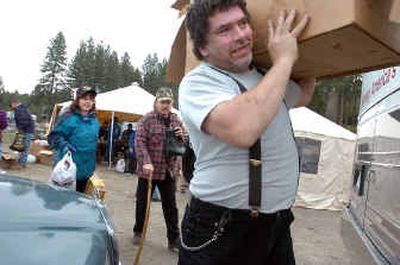Standing up for Vietnam vets

Thirty years ago this month the Vietnam War ended, but the soldiers from that war are still invited to “stand down” at gatherings around the region to find safety and comfort in each other’s company and take care of their basic needs.
“Stand down” is a term used during war for when exhausted combat soldiers on the front lines were removed to a place of relative security where they could get cleaned up, receive medical care, get clean uniforms, and enjoy warm meals and the camaraderie of friends.
Now the term is applied to annual gatherings of veterans who are provided surplus clothing, food, haircuts, medical care, access to government services and the company of fellow veterans through the efforts of veterans advocates and volunteers.
“We’re just making sure the needs of vets are met,” said organizer Robert Shoeman, the local veterans employment representative with the Idaho Commerce and Labor Department.
The first of the post-Vietnam War stand downs was in 1988 in San Diego to respond to the needs of homeless Vietnam veterans in that area.
The most recent was Saturday at the American Legion Post 143 in Post Falls.
Veterans were lined up at 6:30 a.m. at the Legion, waiting for tents full of clothing and food to open, said Michael Pierce, a volunteer with North Idaho Veterans Outreach. Organizers decided to open the tents at 7 a.m. instead of the scheduled 8 a.m., and by mid-morning more than 180 veterans, plus their families, had walked through the five tents, filling boxes carried by high school student volunteers with boots, quilted jacket liners, blankets and food while ‘50s and ‘60s rock ‘n’ roll blasted from the Legion post’s deck.
Dwain Davis and Ed Bush, who served in Vietnam in the late 1960s and now are neighbors in Kellogg, drove to the stand down not so much for the free food and clothes, but for the camaraderie.
“A lot of guys you see are brothers,” Davis said, noting that when he returned from Vietnam, he never knew when someone might hurl a rock or spit at him. At the stand downs, people instead say “thanks,” he said.
Bush said he picked up some gear he could use for hunting, and both talked about the Libby, Mont., stand down held each October. The largest in the region, the Libby event is held over two days, and a couple of years ago it attracted more than 2,300 people, organizers said.
Northwest Montana has the highest concentration of war veterans in the area, said a Veterans Hospital coordinator. The other big annual stand down in the area is in Colville in September.
Webb Petryna, a Vietnam vet who suffers from diabetes caused by Agent Orange, would like to see one in Spokane, where he said many homeless veterans wander the streets and sleep under bridges.
“I know how they feel,” said Petryna, who was homeless from 1977 to 1983. “I wish people would pay more attention to Vietnam vets. We’re the ones who served the country. I’m proud to be a Vietnam vet.”
While Spokane doesn’t host an annual stand down, it has a daily stand down of sorts, called Health Care for Homeless Vets, open at 705 W. Second St., which serves about 500 veterans a month with health care, food and other services, according to organizers.
Saturday’s North Idaho Veterans Stand Down was sponsored by the American Legion, Idaho Commerce and Labor and the International Association of Workforce Professionals, and it was supported with a $5,000 federal grant. Organizers also received $60,000 worth of government surplus goods and food from Second Harvest Food Bank of the Inland Northwest.
The North Idaho Veterans Stand Down committee also continues to operate a food pantry for military families who have members serving in the Iraq war, Shoeman said.